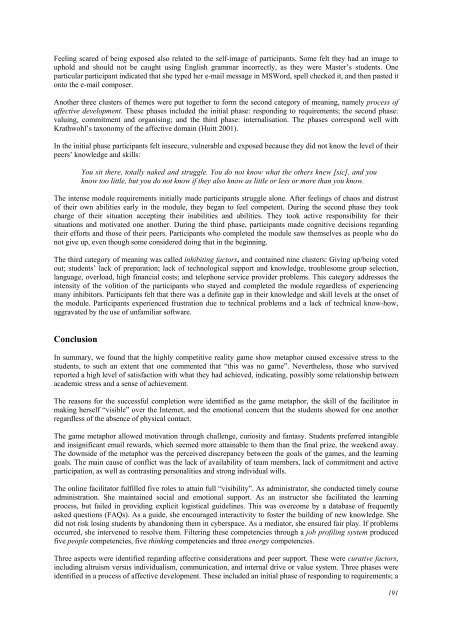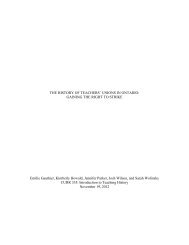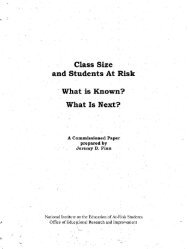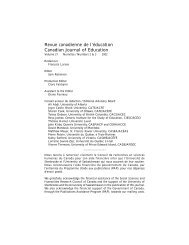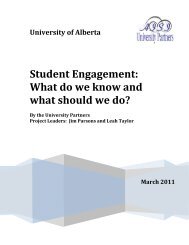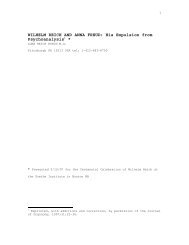October 2006 Volume 9 Number 4
October 2006 Volume 9 Number 4
October 2006 Volume 9 Number 4
Create successful ePaper yourself
Turn your PDF publications into a flip-book with our unique Google optimized e-Paper software.
Feeling scared of being exposed also related to the self-image of participants. Some felt they had an image to<br />
uphold and should not be caught using English grammar incorrectly, as they were Master’s students. One<br />
particular participant indicated that she typed her e-mail message in MSWord, spell checked it, and then pasted it<br />
onto the e-mail composer.<br />
Another three clusters of themes were put together to form the second category of meaning, namely process of<br />
affective development. These phases included the initial phase: responding to requirements; the second phase:<br />
valuing, commitment and organising; and the third phase: internalisation. The phases correspond well with<br />
Krathwohl’s taxonomy of the affective domain (Huitt 2001).<br />
In the initial phase participants felt insecure, vulnerable and exposed because they did not know the level of their<br />
peers’ knowledge and skills:<br />
You sit there, totally naked and struggle. You do not know what the others knew [sic], and you<br />
know too little, but you do not know if they also know as little or less or more than you know.<br />
The intense module requirements initially made participants struggle alone. After feelings of chaos and distrust<br />
of their own abilities early in the module, they began to feel competent. During the second phase they took<br />
charge of their situation accepting their inabilities and abilities. They took active responsibility for their<br />
situations and motivated one another. During the third phase, participants made cognitive decisions regarding<br />
their efforts and those of their peers. Participants who completed the module saw themselves as people who do<br />
not give up, even though some considered doing that in the beginning.<br />
The third category of meaning was called inhibiting factors, and contained nine clusters: Giving up/being voted<br />
out; students’ lack of preparation; lack of technological support and knowledge, troublesome group selection,<br />
language, overload, high financial costs; and telephone service provider problems. This category addresses the<br />
intensity of the volition of the participants who stayed and completed the module regardless of experiencing<br />
many inhibitors. Participants felt that there was a definite gap in their knowledge and skill levels at the onset of<br />
the module. Participants experienced frustration due to technical problems and a lack of technical know-how,<br />
aggravated by the use of unfamiliar software.<br />
Conclusion<br />
In summary, we found that the highly competitive reality game show metaphor caused excessive stress to the<br />
students, to such an extent that one commented that “this was no game”. Nevertheless, those who survived<br />
reported a high level of satisfaction with what they had achieved, indicating, possibly some relationship between<br />
academic stress and a sense of achievement.<br />
The reasons for the successful completion were identified as the game metaphor, the skill of the facilitator in<br />
making herself “visible” over the Internet, and the emotional concern that the students showed for one another<br />
regardless of the absence of physical contact.<br />
The game metaphor allowed motivation through challenge, curiosity and fantasy. Students preferred intangible<br />
and insignificant email rewards, which seemed more attainable to them than the final prize, the weekend away.<br />
The downside of the metaphor was the perceived discrepancy between the goals of the games, and the learning<br />
goals. The main cause of conflict was the lack of availability of team members, lack of commitment and active<br />
participation, as well as contrasting personalities and strong individual wills.<br />
The online facilitator fulfilled five roles to attain full “visibility”. As administrator, she conducted timely course<br />
administration. She maintained social and emotional support. As an instructor she facilitated the learning<br />
process, but failed in providing explicit logistical guidelines. This was overcome by a database of frequently<br />
asked questions (FAQs). As a guide, she encouraged interactivity to foster the building of new knowledge. She<br />
did not risk losing students by abandoning them in cyberspace. As a mediator, she ensured fair play. If problems<br />
occurred, she intervened to resolve them. Filtering these competencies through a job profiling system produced<br />
five people competencies, five thinking competencies and three energy competencies.<br />
Three aspects were identified regarding affective considerations and peer support. These were curative factors,<br />
including altruism versus individualism, communication, and internal drive or value system. Three phases were<br />
identified in a process of affective development. These included an initial phase of responding to requirements; a<br />
191


